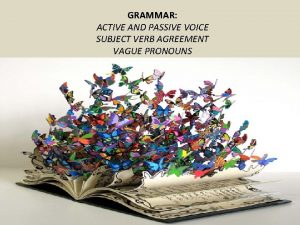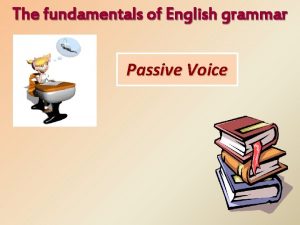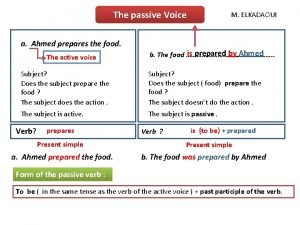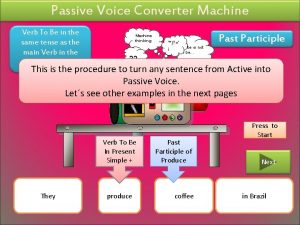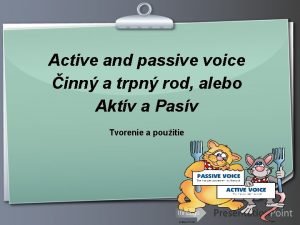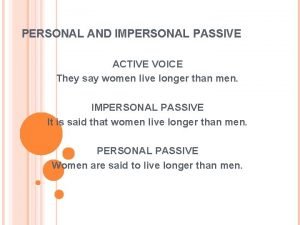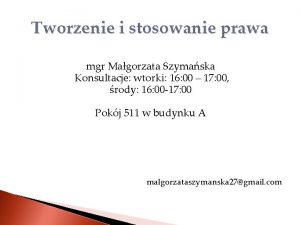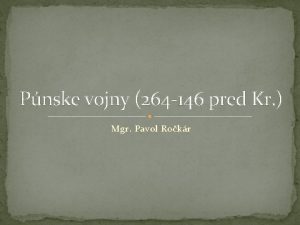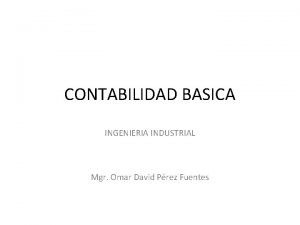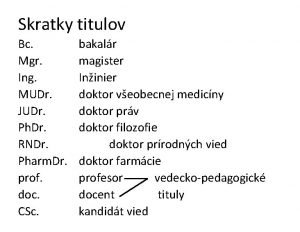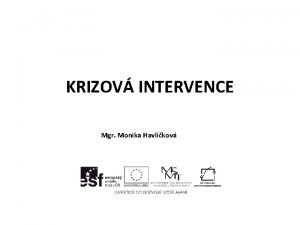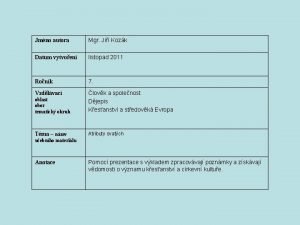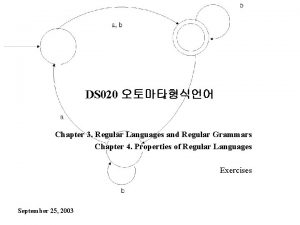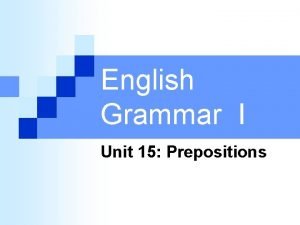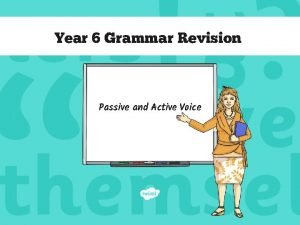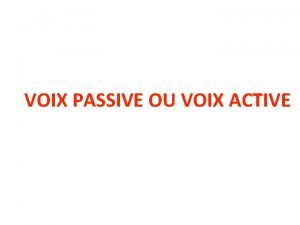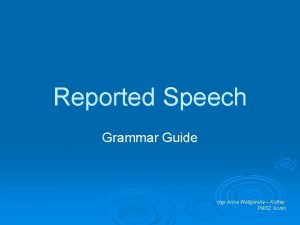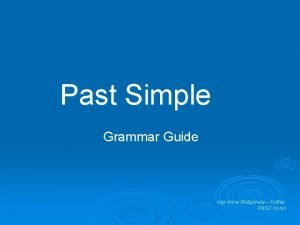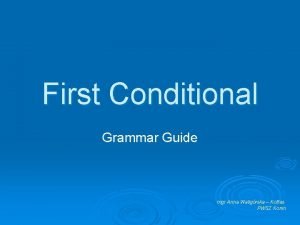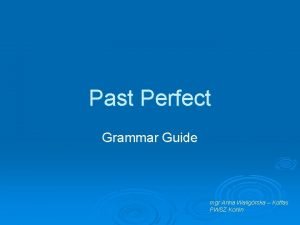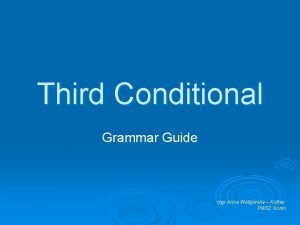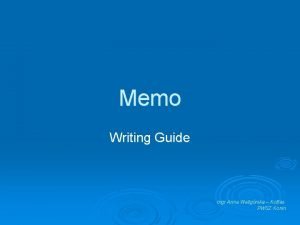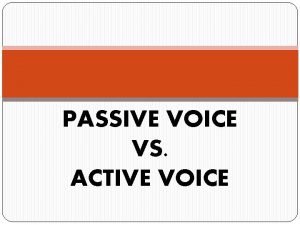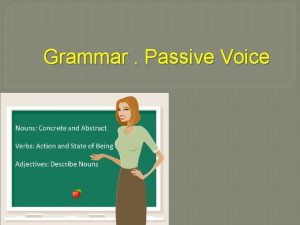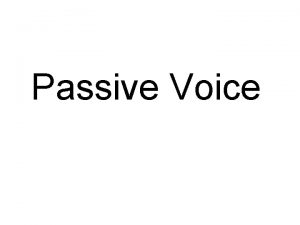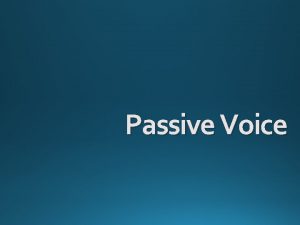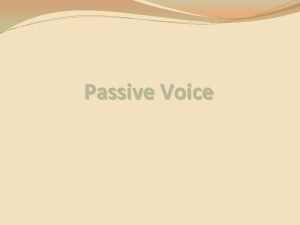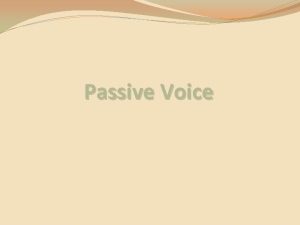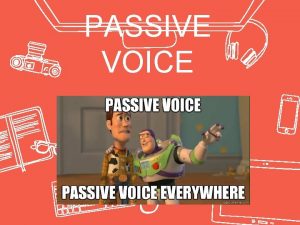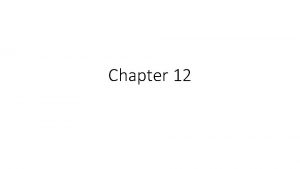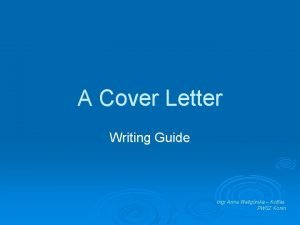Passive Voice Grammar Guide mgr Anna Waligrska Kotfas


































- Slides: 34

Passive Voice Grammar Guide mgr Anna Waligórska – Kotfas PWSZ Konin

Introduction Ø Passive voice is used when the focus is on the action. It is not important or not known who or what is performing the action. My bike was stolen. (= the focus is on the fact that my bike was stolen. I do not know, however, who did it. )

Use: Agent not important We often use the passive: Ø when the agent (the person or thing which causes an action) is not known: She was murdered. (= We don’t know who did it. )

Use: Agent not important We often use the passive: Ø when the agent is obvious from the context or from general knowledge: She has been sacked. (= obviously by her employer)

Use: Agent not important We often use the passive: Ø when the agent is not important or relevant: Wars have been fought throughout history. (= Who fought them is not important here. )

Use: Agent not mentioned We often use the passive: Ø when we wish to avoid mentioning the agent (for example, when we don’t want to directly blame any specific person, or we want to avoid personal responsibility): I see the washing-up hasn’t been done. Oh dear, look, the vase has been broken. Don’t blame me. Nothing can be done about it.

Use: Agent not mentioned Ø By omitting the agent we can describe general feelings, opinions or beliefs rather than those of a particular person or group: São Paulo is said to be the fastest-growing city in South America. Rio de Janeiro has been described as the most beautiful city in the Americas.

Use: Focus on issues The passive is often used in formal English to: Ø focus on the issues rather than on the people involved (this is very common in academic and scientific English): The research was carried out over a period of six months.

Use: Focus on issues The passive is often used in formal English to: Ø describe rules and procedures: Answers must be written in ink. Candidates will be interviewed in alphabetical order.

Use: Focus on issues The passive is often used in formal English to: Ø describe commercial, industrial and scientific processes: Minutes are taken and then submitted to the chair for approval. Components are electronically tagged and transported to the production line.

Use: Focus on issues The passive is often used in formal English to: Ø describe historical, economic and social processes: Tribal lands were sold over a period of fifty years. The currency has been devalued twice since the war.

Verb Form Ø Passive is formed with: TO BE + Past Participle (v-ed / 3 f) l l l the object of the active sentence becomes the subject of the passive sentence the form of the verb is changed (to be + Past Participle) the subject of the active sentence becomes the object of the passive sentence (or is dropped)

Present Simple Passive Ø Active: Subject Verb Object Rita writes a letter. Ø Passive: A letter is written by Rita. to be + 3 f

Present Simple Passive Practice Change active into passive: Ø A: He opens the door. P: Ø A: They don't help you. P: Ø A: Does the police officer catch the thief? P:

Present Simple Passive Practice Change active into passive: Ø A: He opens the door. P: The door is opened (by him). Ø A: They don't help you. P: You aren’t helped (by them). Ø A: Does the police officer catch the thief? P: Is the thief caught (by the police officer)?

Past Simple Passive Ø Active: Subject Verb Object Rita wrote a letter. was written to be + 3 f by Rita. Ø Passive: A letter

Past Simple Passive Practice Change active into passive: Ø A: Somebody hit me. P: Ø A: They didn't make their beds. P: Ø A: Did he send the letter? P:

Past Simple Passive Practice Change active into passive: Ø A: Somebody hit me. P: I was hit. Ø A: They didn't make their beds. P: Their beds weren’t made. Ø A: Did he send the letter? P: Was the letter sent?

Future Simple Passive Ø Active: Subject Verb Object Rita will write a letter. Ø Passive: A letter will be written by Rita. will + v to be + 3 f

Future Simple Passive Practice Change active into passive: Ø A: Jane will buy a new computer. P: Ø A: They won't show the new film. P: Ø A: Will the plumber repair the shower? P:

Future Simple Passive Practice Change active into passive: Ø A: Jane will buy a new computer. P: A new computer will be bought. Ø A: They won't show the new film. P: The new film won’t be shown. Ø A: Will the plumber repair the shower? P: Will the shower be repaired?

Present Continuous Passive Ø Active: Subject Verb Object Rita is writing a letter. Ø Passive: A letter is being written by Rita. to be + v-ing to be + 3 f being

Present Continuous Passive Practice Change active into passive: Ø A: Sheila is drinking a cup of tea. P: Ø A: I am not writing a poem. P: Ø A: Is she watering the flowers? P:

Present Continuous Passive Practice Change active into passive: Ø A: Sheila is drinking a cup of tea. P: A cup of tea is being drunk. Ø A: I am not writing a poem. P: A poem isn’t being written. Ø A: Is she watering the flowers? P: Are the flowers being watered?

Present Perfect Passive Ø Active: Subject Verb Object Rita has written a letter. Ø Passive: A letter has been written by Rita. have + 3 f to be + 3 f been

Present Perfect Passive Practice Change active into passive: Ø A: Kerrie has paid the bill. P: Ø A: They haven’t read the book. P: Ø A: Has she phoned them? P:

Present Perfect Passive Practice Change active into passive: Ø A: Kerrie has paid the bill. P: The bill has been paid. Ø A: They haven’t read the book. P: The book hasn’t been read. Ø A: Has she phoned them? P: Have they been phoned?

Sentences with two objects Ø Rewriting an active sentence with two objects in passive voice means that one of the two objects becomes the subject, the other one remains an object. Ø Which object to transform into a subject depends on what you want to put the focus on.

Sentences with two objects Subject Verb Object 1 Object 2 Ø A: Rita wrote a letter to me. Ø P: A letter I was written to me by Rita. was written a letter to by Rita.

Sentences with two objects Practice Change active into passive: Ø A: Our neighbour gives me (1) a lift (2). P: P: Ø A: She told him (1) a lie (2). P: P: Ø A: They will offer her (1) a seat (2). P: P:

Sentences with two objects Practice Change active into passive: Ø A: Our neighbour gives me (1) a lift (2). P: I am given a lift. P: A lift is given to me. Ø A: She told him (1) a lie (2). P: He was told a lie. P: A lie was told to him. Ø A: They will offer her (1) a seat (2). P: She will be offered a seat. P: A seat will be offered to her.

Sentences with two objects Practice Change active into passive: Ø A: I am sending them (1) a letter (2). P: P: Ø A: The waiter has brought us (1) the coffee (2). P: P:

Sentences with two objects Practice Change active into passive: Ø A: I am sending them (1) a letter (2). P: They are being sent a letter. P: A letter is being sent to them. Ø A: The waiter has brought us (1) the coffee (2). P: We have been brought the coffee. P: The coffee has been brought to us.

Bibliography 1. 2. 3. 4. 5. 6. Bourke K. : Verbs and Tenses: Intermediate. Test it, Fix it. Oxford: Oxford University Press, 2006. Leech G. , Cruickshank B. , Ivanic R. : An A-Z of English Grammar & Usage. Harlow: Longman, 2004. Murphy R. : English Grammar in Use. Cambridge: Cambridge University Press, 2006. Swan M. : Practical English Usage. Oxford: Oxford University Press, 2005. Thomas A. J. , Martinet A. V. : A practical English Grammar. Oxford: Oxford University Press, 1986. Vince M. : Intermediate Language Practice (New Edition). Oxford: Macmillan Education 2010.
 Ms sullivan teaches us grammar change the voice
Ms sullivan teaches us grammar change the voice Could passive voice
Could passive voice Voices in english grammar
Voices in english grammar Pattern active and passive voice
Pattern active and passive voice Active passive rules
Active passive rules Passive voice machine
Passive voice machine Present indefinite tense
Present indefinite tense Passive voice vs active voice
Passive voice vs active voice Passive voice impersonal and personal
Passive voice impersonal and personal Mgr z kropką czy bez
Mgr z kropką czy bez Mgr luc cyr
Mgr luc cyr Druha punska vojna
Druha punska vojna Mgr. pavol hrvol
Mgr. pavol hrvol Milan pilát psycholog
Milan pilát psycholog Mgr krpoun
Mgr krpoun Contabilidad ingenieria industrial
Contabilidad ingenieria industrial Mgr. veronika fuchsová
Mgr. veronika fuchsová Mgr. petra hovězáková
Mgr. petra hovězáková Mgr. pavel pražák
Mgr. pavel pražák Mgr
Mgr Petr beck
Petr beck Dalibor kott
Dalibor kott Doktor práv skratka
Doktor práv skratka Mgr. monika havlíčková
Mgr. monika havlíčková Mgr jan kozák
Mgr jan kozák Mgr family tree
Mgr family tree How to convert right linear grammar to left linear grammar
How to convert right linear grammar to left linear grammar Strengths of traditional grammar
Strengths of traditional grammar Chomsky hierarchy of grammars
Chomsky hierarchy of grammars Closure properties of regular languages
Closure properties of regular languages Class 1a
Class 1a 8b grammar the passive
8b grammar the passive Revision: passive voice
Revision: passive voice Panic seized the writer passive voice
Panic seized the writer passive voice Exercice passive voice
Exercice passive voice
